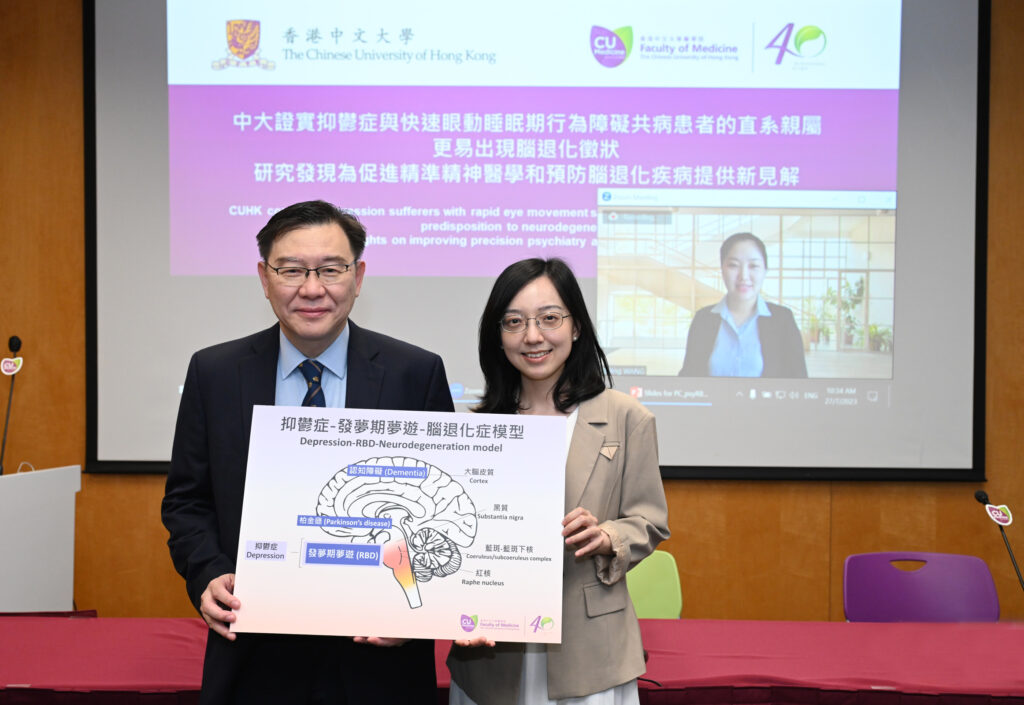CUHK
News Centre
CUHK confirms depression sufferers with rapid eye movement sleep behaviour disorder harbour familial predisposition to neurodegeneration Provides new insights on improving precision psychiatry and preventing neurodegeneration
The Chinese University of Hong Kong’s (CUHK) Faculty of Medicine (CU Medicine) conducted a family study to investigate the interrelationship among major depressive disorder (MDD), rapid eye movement sleep behaviour disorder (RBD) and neurodegeneration. Results revealed that families of patients with psychiatric RBD harbour a higher risk of a spectrum of α-synucleinopathy features, compared to family of patients with psychiatric disorders only and control subjects without psychiatric disorders. This sheds light on the heterogeneity and subtyping of depression related to the co-occurrence of RBD, which may help to improve precision psychiatry and pave the way for early prevention of neurodegeneration by systematically identifying RBD in patients with psychiatric disorders. Study details have been published in the leading international journal1 Journal of Neurology, Neurosurgery, and Psychiatry.
Psychiatric RBD is common and under-investigated
MDD is a common psychiatric disorder in the general population. MDD is associated not only with personal distress and functional impairment, but in some cases also with a future risk of Parkinson’s disease and dementia, albeit the underlying pathways are unclear. RBD is the most specific prodromal stage of α-synucleinopathy neurodegeneration, including Parkinson’s disease and dementia with Lewy bodies. It frequently occurs in patients with psychiatric disorders, especially MDD, but it is unclear whether psychiatric RBD is merely secondary to antidepressant use or a variant of typical idiopathic RBD.
A study2 from last year, also in the Journal of Neurology, Neurosurgery, and Psychiatry, by CU Medicine’s Department of Psychiatry, found that 1 out of 11 MDD patients suffered from video-polysomnography (vPSG) confirmed RBD. The prevalence is nearly 10 times that of the general population.
Professor Huang Bei, Research Assistant Professor in the Department of Psychiatry at CU Medicine, said, “It is worth noting that MDD comorbid RBD is common. Patients present with a higher level of neurodegenerative prodromal markers such as olfaction deficit, colour vision dysfunction and reduced striatal dopamine transmission, compared to patients with MDD only. These findings suggest that RBD occurrence in the context of MDD might indicate a higher neurodegenerative risk.”
Confirming the risk of neurodegeneration with psychiatric RBD by family study design
To further confirm the underlying risk of neurodegeneration associated with psychiatric RBD, the Psychiatry team spent four years conducting a family study that compared occurrence of α-synucleinopathy neurodegeneration features in family members of psychiatric patients with and without RBD. They recruited 1,371 participants, including the first-degree relatives of individuals without psychiatric disorders (non-psychiatric control), patients with psychiatric disorders only (psychiatric control), and patients with psychiatric disorders comorbid with RBD (psychiatric RBD).
Compared with the non-psychiatric and psychiatric control groups, the psychiatric RBD group presented with a higher level of a spectrum of α-synucleinopathy features, including video-polysomnography-confirmed RBD diagnosis and core features, neurodegenerative prodromal markers, and overt diagnoses of Parkinson’s disease and dementia, suggesting an underlying neurodegenerative pathology in the families of psychiatric RBD sufferers.
Dr Wang Jing, honorary postdoctoral fellow in CU Medicine’s Department of Psychiatry, explained, “The study findings prove that psychiatric RBD is not simply a drug-induced phenomenon but is associated with underlying neurodegeneration. The results further indicate that psychiatric RBD is a variant of idiopathic RBD in terms of the association with neurodegeneration.”
Heterogeneity of depression suggested by RBD
On the other hand, there was no confirmed risk of neurodegeneration for family members of psychiatric patients without RBD, which may suggest the heterogeneity of the etiology of depression: psychiatric RBD might represent a subtype of depression characterised by a later onset and more severe depressive symptoms, and associated with underlying neurodegeneration; while MDD without RBD (psychiatric control) might represent a subtype characterised by an earlier onset and familial aggregation of depression, but without any apparent risk for α-synucleinopathy neurodegeneration.
Professor Wing Yun-kwok, Chairman of CU Medicine’s Department of Psychiatry, concluded, “This study not only clarifies the diagnostic entity of psychiatric RBD, but also indicates that occurrence of vPSG-confirmed RBD might signal a subtype of depression with underlying neurodegeneration. From the perspective of neurodegeneration, this study highlights the need to systematically identify RBD in the psychiatric population, MDD in particular, and probably prioritise these patients for potential neuroprotective intervention to prevent future neurodegeneration. From the perspective of psychiatric management, RBD might help to subtype the patients with psychiatric disorders, optimising treatment and improving precision psychiatry.”
The original study can be accessed here:

CU Medicine’s Department of Psychiatry conducts a family study and finds that families of patients with major depressive disorder and RBD harbour a higher risk neurodegeneration.
(From left) Department Chairman Professor Wing Yun-kwok, Research Assistant Professor Professor Bei Huang and honorary postdoctoral fellow Dr Wang Jing of CU Medicine’s Department of Psychiatry.

Mr Leung (right), aged 68, was diagnosed with depression and RBD some ten years ago. Several of his first-degree relatives also suffer from psychiatric disorder including depression. His second younger brother (left) was diagnosed with RBD through video-polysomnography when joining the CUHK study. Despite the higher risk of neurodegeneration, the brothers act positively and do exercise to slow down the progression.



